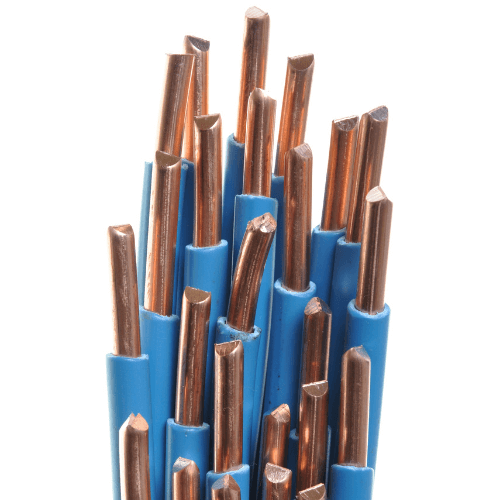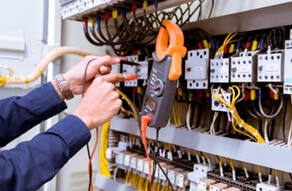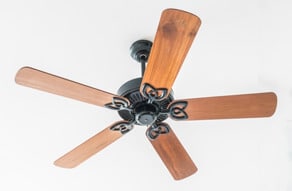Call us now
0439 823 190What Are Electrical Wires and Cables Made Out Of?
Posted on April 12, 2021

Electrical wires and cables are used in many different places and are made up of specific materials. These materials have different advantages and disadvantages and will be applied depending on the wire’s transmission medium. Electrical cables and wires are made of different materials to help with conducting electricity to insulation purposes. The Local Electrician offers our Emergency Electrician team to work on electrical wires and cables, performing electrical repairs and installations.
The main materials used in electrical wires and cables are:
- Copper – main material used being a good conductor of electricity and inexpensive
- Aluminium – also a common material but is not as conductive as copper
- Gold – non-conductor used to prevent oxidation or corrosion and applied in bonding and to plate connectors
- Silver – high-conductor with low resistance for metal-to-metal connections and helps reduce heat
- Tungsten – used when wires need more resistance and not melt
What are the Materials Used in Electrical Wires and Cables?
Wires contain a level of resistivity to electrical currents, the lower the resistivity the more current it can push through. Different materials have various resistance and conductive levels while having different rust or corrosion resistance levels. Oxidation is when a metal rusts or corrodes from moisture reacting with the metal’s surface. This will eat at the metal making it break, exposed and unusable.
Below is a guide on the types of materials that are included in wires and cables. Each material has its own pros and cons and will be used depending on the type of wire.
| Material | Description |
| Copper | Copper is the most common material used inside wires and cables. This is because it is affordable and has a low resistivity level which means it can conduct electricity extremely well.
Copper is also great at not rusting as it is less oxidative than other metals. It will not rust but copper oxide will cover the material, and instead of ruining it, it protects the material. This means that it will not disrupt the conductivity of copper. |
| Aluminium | Aluminium is another good conductor of electricity and used in wires and cables. It is a clear downgrade to copper though as it is less effective at conducting electricity when compared to copper. The metal is also more likely to oxidize but an anti-oxidant solution will be applied to combat this. Aluminium also has the chance to expand over time and could easily lead to a fire safety concern. |
| Gold | Gold is not a good conductor of electricity but is it excellent at preventing rust and corrosion. This is why it is applied to specific areas of wires and cables to help prevent oxidation. When bonding items together gold will also be applied to help prevent corrosion. Gold is expensive though which is why it is not used excessively. |
| Silver | Silver is better at conducting electricity when compared to copper which is frequently used. The downside of silver in wiring is that it is more expensive than copper. Silver will mainly be used in scientific equipment, electrical contacts in switches and other places where silver’s low resistance is needed. |
| Tungsten | The metal of tungsten is minimally used but will be applied in wires where they need resistance. In appliances, such as incandescent lighting fixtures, where the wires may melt tungsten will be used. |
To know about the electrical wiring types, colours and sizes, our blog offers a detailed explanation of this topic.
What are the Materials Used in Electrical Wires and Cables Insulation?
It is important the electrical wires and cables are insulated correctly to prevent them from becoming extremely hot or sparking.
Below is a guide on some of the main materials used in electrical wires and cables for insulation:
| Material | Description |
| Clay | For most high voltage insulated wires clay is the most common material applied. This is because it is easy to work with and can insulate high voltage cables effectively. |
| Plastic | In basic wires plastic has replaced rubber and is used to insulate individual wires. |
| Glass | A less common material for insulation of wires, glass made of soda ash, limestone and silica will insulate low voltage wires. |
| Paper/ Cardboard | If the cable is low in voltage and heat then paper and cardboard can be used as a cheap alternative. This method is not commonly used as it is unsafe and unreliable than other insulation materials. |
| Mica | Mica insulation is good for wires which are exposed to elements more often. Sheet mica boards are a good insulator for electrical cables and used in most capacitors. |
Reliable 24 Hour Electricians and Electrical Wires Services
The Local Electrician has over 25 years of experience working with electrical wires and cables across Sydney. Our fully qualified electricians will be able to operate with wiring and cabling systems, installing and repairing them. Offering Level 2 Electrician workers as well allows us to operate with more advanced wiring systems. From replacing VIR Cables, working with overhead cables to operating with general domestic wiring systems we are always here to help.
Our electricians working with electrical wiring and cables will operate across all of Sydney, including South Western Sydney and the Northern Beaches.

For professional electricians to work with electrical wires and cables – contact The Local Electrician on 0439 823 190!
Lifetime Warranty on Workmanship and Labor
Our Services
Our skilled electricians are qualified to carry out any electrical repair or installation within Sydney. We strive to deliver absolute customer satisfaction by offering electrical services that are affordable, safe and long lasting.
- Private Power Pole Installation: What Sydney Homeowners Need To Know - November 29, 2023
- Understanding Power Outages: When To Call a Level 2 Electrician - November 14, 2023
- Understanding Level 2 Electrical Needs: FAQs for Sydney Homeowners - October 7, 2023
Our Level 2 Local Electrical Services










